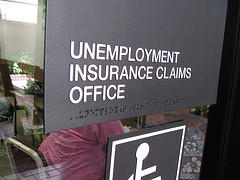
Section Branding
Header Content
Unemployment Benefit Changes Afoot
Primary Content

Georgians who lose their jobs next year could see smaller unemployment checks. Cutting back benefits would be part of the state’s plan to re-pay $700 million it borrowed from the federal government to cover unemployment reserves. A look at the difficult road ahead for state leaders and the unemployed.
Walk into the DeKalb County career services center, and there’s a buzz of activity. A few dozen unemployed workers are taking classes and searching job listings along a row of computers.
Gwendolyn Hudson is here for a class. The Clarkston resident lost her job as an executive assistant in August.
She’s applied for about 60 jobs, just in the last month. And she’s not the only family member looking for work.
“My husband lost his job a couple of years ago. He’s 61 – no one’s touching him. So it’s really up to me to get a job,” she said while waiting for a ride. “We have a 12-year-old. I did manage to get him on free lunch but that’s about all we got. So it’s been pretty hard. I need a job.”
Hudson has had a lot of interviews. But rejections are also piling up.
“The Wednesday before Thanksgiving, I got six emails saying I didn’t get the job,” she said.
Across the career center from Hudson is Brian Burns. The 54-year-old Atlanta resident says he’s mulling his next step after a broadcasting career. But the current economy leaves him with fewer options.
“I have a real estate license. That isn’t worth anything in this environment,” he said while looking at job listings. “So at 54, how do you recreate yourself? That’s the biggest challenge.”
Because Hudson and Burns are already receiving jobless pay, they wouldn’t lose benefits under the plan Labor Commissioner Mark Butler is proposing.
He says the state needs to do something quickly because the unemployment fund that pays out benefits is stretched thin.
“Now we’re in a situation where we’re almost paying out right now as much out of our trust fund than what we have coming in, and that’s really not sustainable,” he said in an interview.
Butler’s plan would reduce the maximum weekly benefit by $30 to $300. And it would cut the longest amount of time a worker could receive benefits by six weeks to 20 weeks.
Butler says the cuts would allow the state to make a dent in paying back $700 million it borrowed from the federal government to keep the unemployment trust fund afloat.
But critics say the plan would be unfair to the newly unemployed. And they say the reserve that companies fund for unemployment benefits is low because of the state’s mismanagement.
Clare Richie is with the non-partisan Georgia Budget and Policy Institute. She says the state keeps letting employers off the hook.
“For more than a decade, Georgia basically cut unemployment insurance taxes that employers were paying, even when times were good,” Richie said in an interview. “And in fact in the period from 2000 to 2003 virtually all employers paid no unemployment insurance tax.”
As a result, she says the state depleted more than half of a $2 billion reserve. The fund would have had more money if the state had then followed through with planned increases in the unemployment insurance taxes companies pay.
“It’s just important to understand we don’t have a spending problem in the state when it comes to unemployment insurance,” she said. “We have a revenue problem.”
Butler became the Labor Commissioner in January. He agrees past employer tax holidays were a bad idea. But he says companies are now paying more.
Unemployment insurance works like other types of insurance. The more a company needs it, the more it pays.
And Butler says most employers are paying more because they’ve cut staff recently. On top of that, they’re paying a 35 percent surcharge the last Labor Commissioner put in place.
“We’re trying to come up with a balanced approach,” he said. “People say, ‘Well you’re not proposing any kind of increase on businesses.’ Well, no, because they’ve already been hit. They’ve already seen increases.”
He says employers will soon be paying more in federal unemployment insurance taxes. They will go up every year Georgia hasn’t paid off the federal loan.
Butler says even if his proposal passes, jobless workers like the ones at the DeKalb County Career Services Center could still apply for federal unemployment benefits after they exhaust state support.
State lawmakers will consider Commissioner Butler’s proposal when they reconvene next month for the legislative session.
Click here for additional information and resources for job seekers
Tags: unemployment, unemployment benefits, Mark Butler, unemployment trust fund
